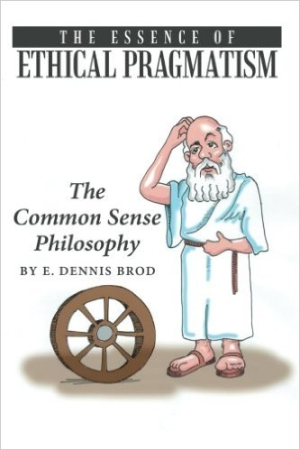The Essence of Ethical Pragmatism
The Common Sense Philosophy
- 2016 INDIES Finalist
- Finalist, Philosophy (Adult Nonfiction)
There is much compassion and food for thought in this readable work of philosophy.
In The Essence of Ethical Pragmatism: The Common Sense Philosophy, E. Dennis Brod explains a straightforward, everyday thought system based on objective observation, realism, and critical thinking.
Starting from the belief that all human life has value, Brod traces the lineage of his common-sense approach from Aristotle onward. Drawing on thinkers including Immanuel Kant, Thomas Paine, and William James, he contends that philosophy must produce measurable results; if it doesn’t work, it should be replaced.
Observing incompetence and hypocrisy in government and society, the author proposes that these current systems are faulty. The book forwards historical case studies and situations from daily life to show how ethical pragmatism’s steps (observe, analyze, evaluate, and conclude) might be implemented in problem-solving.
Laymen may be wary of attempting a full-length philosophy text, but this one successfully targets the average reader with a lucid writing style, step-by-step advice, and relevant examples. Indeed, Brod maintains that a philosopher is “almost anyone who cares to develop a belief or way of thinking”—in which case all people, whether deliberately or unwittingly, are philosophers in their everyday lives.
The volume offers simple tips on topics such as deciding if you have impartial facts, learning to identify cause and effect, and assessing whether the actions you are considering will have the desired results; the advice should be easy to put into practice. However, the cartoonish cover image and internal illustrations undermine the delivery somewhat.
Interesting and often unexpected historical case studies are shared, ranging from Confucius to Martin Luther King, Jr. Many of these figures would not have consciously chosen to identify with ethical pragmatism, yet inadvertently adopted its principles.
The book provides fresh interpretations of seemingly cut-and-dried circumstances. For instance, Brod argues that Abraham Lincoln issued the Emancipation Proclamation not out of an overwhelming conviction that slavery was wrong, but because doing so would give the Union an advantage in the Civil War.
Throughout, the volume includes elucidative passages from other philosophers, some of them used as chapter epigraphs. This produces an engaging blend of centuries-old wisdom and cutting-edge discussion. A helpful appendix gives biographical details on all historical figures mentioned.
Brod does not shy away from controversial issues like capital punishment and illegal immigration. Although he carefully avoids taking unfounded stances, he points out what is detrimental to society and gives the ethical pragmatist’s viewpoint on how laws could change for the better. Beyond hot-button issues, he also addresses offbeat problems that people might not be aware of, like noise and the lack of standardization in North American English, and again suggests practical solutions.
A common objection to pragmatism or parent philosophies like utilitarianism might be that they deal in abstractions and do not allow for sympathy when faced with individual human situations. Though Brod does express the belief that it is necessary to disregard “corrupting emotions,” his insistence on the worth of human life is the basis for a compassionate approach. There is much food for thought in this readable philosophical book.
Reviewed by
Rebecca Foster
Disclosure: This article is not an endorsement, but a review. The publisher of this book provided free copies of the book and paid a small fee to have their book reviewed by a professional reviewer. Foreword Reviews and Clarion Reviews make no guarantee that the publisher will receive a positive review. Foreword Magazine, Inc. is disclosing this in accordance with the Federal Trade Commission’s 16 CFR, Part 255.

